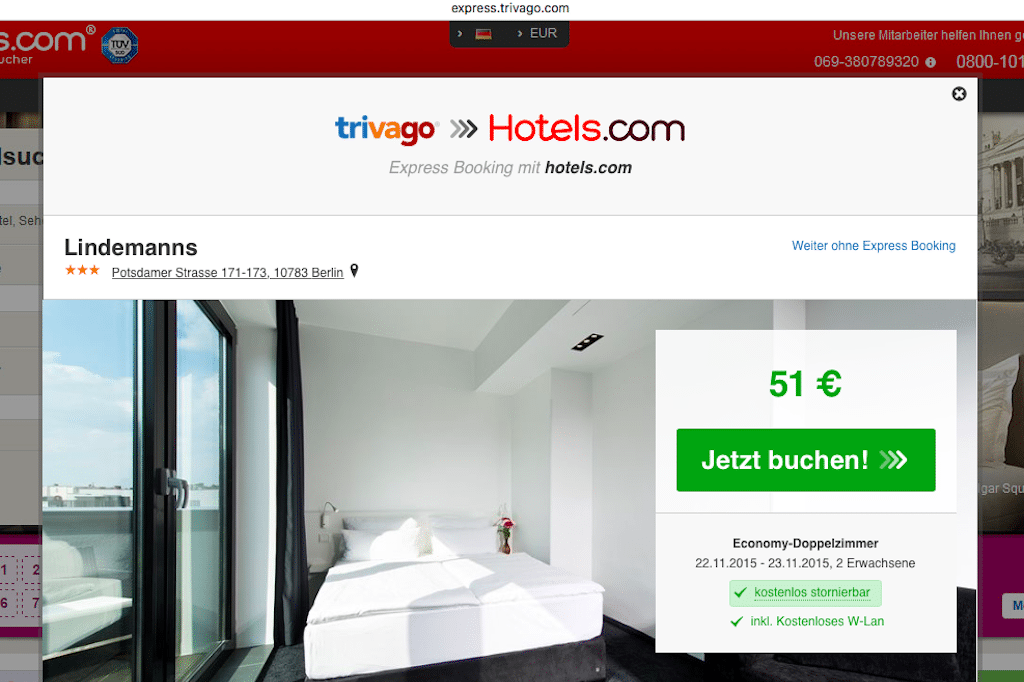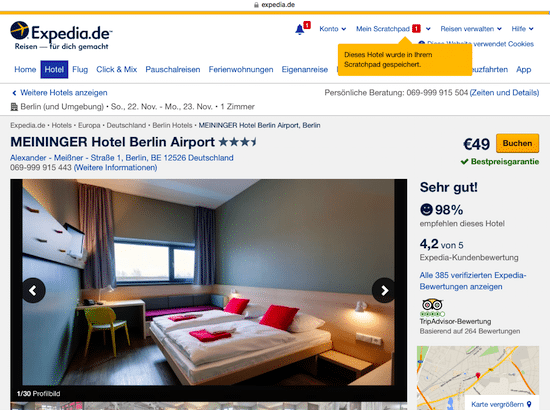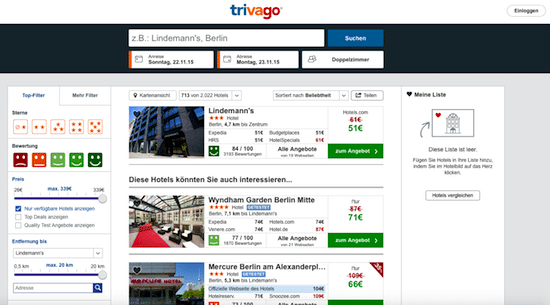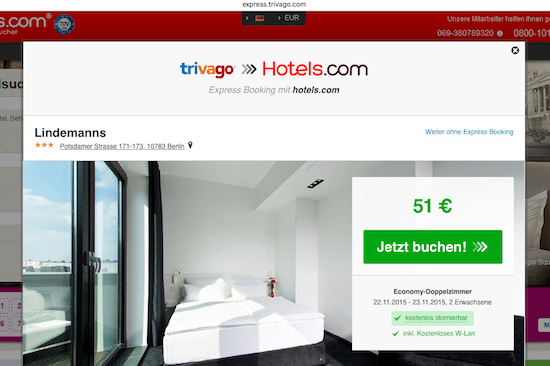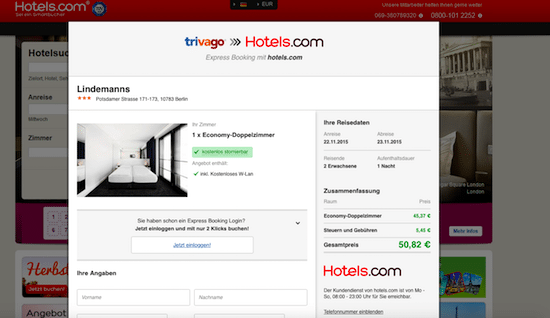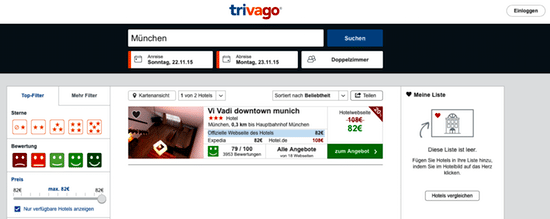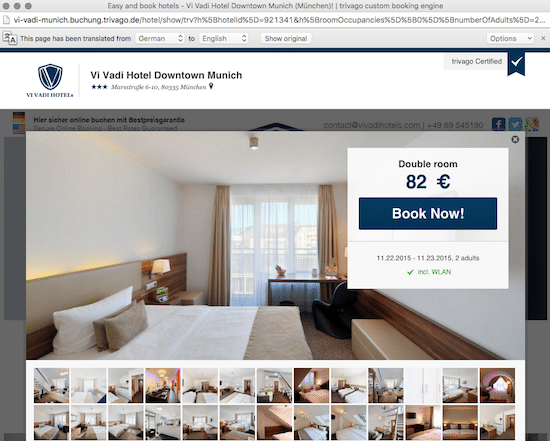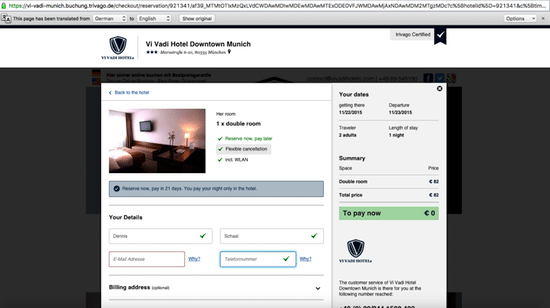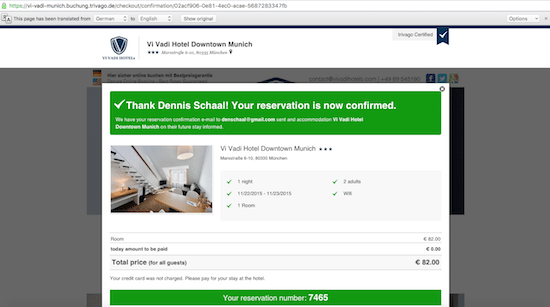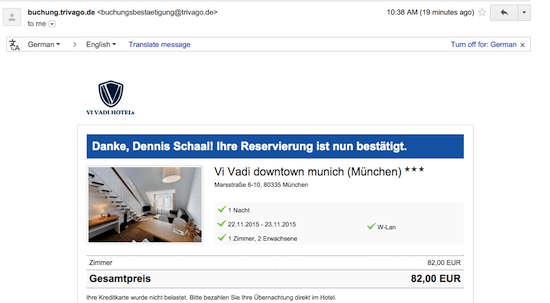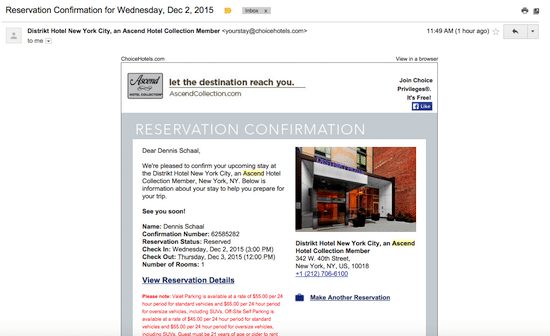Skift Take
Trivago is trying to develop a more partner-friendly booking flow than TripAdvisor has done with Instant Booking. But Trivago, which admittedly is still experimenting with its new features, still has ample consumer confusion to sort out.
With Expedia rival Booking.com agreeing to offer its hotel bookings on TripAdvisor, Expedia Inc. CEO Dara Khosrowshahi was quick to point out last week that Expedia-owned Trivago “is now pretty aggressively testing out a product that looks like [TripAdvisor] Instant Book.”
Actually, it doesn’t.
In a first look at the Trivago hotel-booking initiative, it is clear that the look and feel of TripAdvisor Instant Booking and what Trivago is calling Express Booking are vastly different, as are the philosophies behind them and the business models.
But there are gray areas, as well — at least for now.
During Expedia’s third quarter earnings call October 30, Khosrowshahi pointed to some of the differences between Trivago’s and TripAdvisor’s rollouts. “We think that there is a lot more clarity again on where the consumer is booking their travel,” Khosrowshahi said. “Trivago is simply trying to optimize that path versus let’s say gather consumer data to upsell them other stuff. So they are very, very focused on just optimizing that consumer experience in that moment.”
In fact, Trivago managing director Johannes Thomas tells Skift, “it is important to clarify that we are not taking bookings on Trivago. So our users are not ‘Booking on Trivago’ but we are rather helping to facilitate the booking funnel, and create a smoother booking experience with an optimized UX (user experience) via an overlay on the booking site.”
Trivago actually has just launched in Germany two types of facilitated bookings, Express Booking for online travel agencies, and an Internet booking engine for hotels, and plans to expand them into additional markets in 2016.
As we’ll show in more detail below, Thomas’ statement that Trivago actually isn’t taking any bookings itself doesn’t appear to be entirely factual, although these products are new and evolving and are subject to change.
For example, I booked a stay through Trivago using its Internet booking engine for the website of the Vi Vadi Hotel Downtown Munich and when I emailed the hotel afterwards to cancel the reservation, the hotel replied: “As you booked the hotel room via Trivago, we would please ask you to cancel the reservation there as we are not able to do so.”
However, Thomas says the Internet booking engine for hotels “is still in closed beta and is getting fine-tuned so it might not be seamless yet, depending on the case.
With that caveat, in general while TripAdvisor is trying to get consumers accustomed to viewing TripAdvisor and its apps as booking destinations, with Book on TripAdvisor buttons all over its sites, Trivago’s facilitated bookings appear as an extension of partners’ websites. There is no such thing as a Book on Trivago button.
Regarding the business models, while TripAdvisor Instant Booking has hotels and online travel agencies paying TripAdvisor a commission, Trivago hasn’t strayed from its cost-per-click model, Thomas says.
Both TripAdvisor and Trivago are trying to address the disruption of mobile devices and relatively small screens — compared with desktops, at least — and the traditional challenges in handing off consumers to third-party websites of disparate qualities to complete a metasearch-instigated booking. Without this new wave of Instant Booking or Express Booking models, conversion of mobile lookers into bookers can be challenging.
Trivago actually has just launched in Germany two types of facilitated bookings, Express Booking for online travel agencies, and an Internet booking engine for hotels, and plans to expand them to additional markets in 2016.
Let’s look at the changes.
Until now on Trivago, if you click on an an Expedia link for the Meininger Hotel Berlin Airport, Trivago exclusively directed you to Expedia.de to complete the booking.
But now Trivago has rolled out Express Booking with Expedia-owned online travel agencies such as Hotels.com, for example.
In German, Trivago.de touts Express Booking like this: “Book as soon as never before. Uniform, uncomplicated booking form. In no time, book on the move. Perfect for smartphones and tablets.”
In this example of Trivago Express Booking below, the consumer can click on the Hotels.com link for Lindemann’s hotel in Berlin. There is no verbiage about Trivago’s role in the booking.
The next page is an express.trivago.com overlay over the Hotels.com site (shown in the background), with plenty of Trivago and Hotels.com branding, and the subhead, “Express Booking with Hotels.com.”
When you click on the Book Now button, you are transported to a co-branded page to fill in your payment details. Again, this is an overlay over the Hotels.com site so it appears to be in the Hotels.com ecosystem.
In the above screen it makes clear: “The customer service from Hotels.com is from Monday to Sunday – reachable 23:00 o’clock for you to 08:00. You must present a photo ID when checking in. Your credit card will be charged at time of booking.”
Unlike TripAdvisor, which strives to keep the user experience within the TripAdvisor ecosystem, albeit with partner branding and customer service, Trivago is attempting to provide a uniform user experience for partners within — or over — their own websites, which are displayed in the background.
“… We are focused on remaining as an independent, credible, unbiased source, which our users can trust,” says Thomas of Trivago. “Therefore, it is important for us to distinguish that we are making the market transparent versus taking bookings. We are careful not to dilute our value proposition as a meta, which is our core (which is not the case for others).”
The “others” obviously are a reference to TripAdvisor.
But things get murkier for Trivago when a consumer books a hotel using the Internet booking engine that Trivago is offering for hotel partners as opposed to Express Booking for online travel agencies. As referenced above, users can select the hotel website booking option for the Vi Vadi Hotel Downtown Munich.
That takes consumers to a Trivago custom booking engine for the Vi Vadi Hotel Downtown Munich that really has no Trivago branding.
When users select Book Now, they navigate to a page branded Vi Vadi Hotel Downtown Munich, where they can enter their payment details.
After submitting the payment information, the user sees a message, presumably from the hotel, indicating that “your reservation is now confirmed.” The reservation confirmation is overlayed over the hotel website.
At this point confusion for the consumer sets in. The user receives an email confirmation of the reservation with the hotel’s branding, but Trivago sent the email. The address on the bottom of the email is for Trivago’s Dusseldorf headquarters, and it even cites the names of Trivago’s managing directors in the email.
As I noted earlier, I emailed the hotel to try and cancel the reservation, but a Vi Vadi hotel representative emailed me back that I would have to cancel the reservation through Trivago because the booking took place with Trivago, not the hotel.
This apparently isn’t the way things are supposed to work as the product is in closed beta and getting fine-tuned, Thomas says.
“For the hotel booking engine we provide the full technical capabilities,” Thomas says. “This includes the booking funnel and confirmation. The booking and customer details go straight into the hotels channel manager or CRS (central reservations system). “It owns the booking and can build up the guest relation. Most critical here is the experience for the user while he books. The booking path is fully branded with the look and feel of the hotel and the guest is therefore starting his journey with the hotel directly.”
In contrast, when you book a hotel on TripAdvisor through one of its hotel partners, the hotel and TripAdvisor email you the confirmation, to ensure the guest knows that customer service is being handled by the hotel or online travel agency partner. A confirmation from a hotel looks like this:
And you can cancel the reservation, or get other customer service issues addressed, directly with the hotel — not TripAdvisor.
Thomas of Trivago explains the thinking about its Internet booking engine for hotels: “For hotels, it is basically a booking engine that hoteliers can use and customize with their own logo and colors etc. We want to make our optimized booking funnel accessible to hotels as well but want to ensure a strong branding effect of the hotel towards its guests.”
“This secures that we are not seen as the booking site and stay independent,” Thomas adds. “For hotels it helps to achieve a high booking conversion and the opportunity to build stronger bonds with their guests, so strengthening their actual direct channel.”
All of these booking initiatives from various metasearch sites — whether they are truly merely facilitated ones for the hotel or performed directly on the metasearch sites — are subject to change as TripAdvisor, Trivago and even Google are experimenting with their partners and users.
Says Thomas: “This is our current status. However, we are continuously testing and learning more in order to better understand what works best for our users.”
It is clear that this is the beginning of the beginning as metasearch sites transition in various ways to make bookings smoother for themselves and their partners in the mobile era.
Trivago is clearly offering a different user experience for these facilitated bookings than sites such as TripAdvisor, Kayak and Hipmunk, to name a few, have done.
You can expect a lot more tweaks and big changes in the future.
The Daily Newsletter
Our daily coverage of the global travel industry. Written by editors and analysts from across Skift’s brands.
Have a confidential tip for Skift? Get in touch
Tags: expedia, hotels, instant booking, tripadvisor, trivago
Photo credit: Trivago rolled out Express Bookings with the aim of streamlining bookings for online travel agencies, and an Internet booking engine for hotel partners. The image above shows Trivago's implementation of Express Bookings for Hotels.com. Trivago
